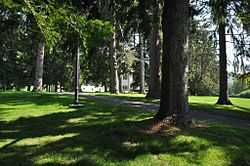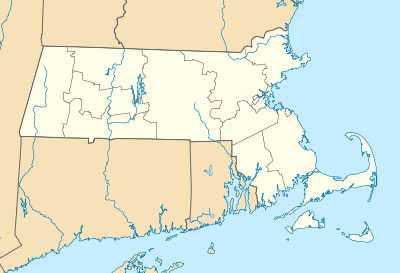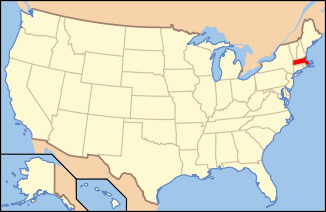Villa Virginia
|
Villa Virginia | |
 | |
 | |
| Location | Stockbridge, Massachusetts |
|---|---|
| Coordinates | 42°16′27″N 73°18′41″W / 42.27417°N 73.31139°WCoordinates: 42°16′27″N 73°18′41″W / 42.27417°N 73.31139°W |
| Built | 1914 |
| Architectural style | Renaissance |
| Governing body | Private |
| NRHP Reference # |
83003930 [1] |
| Added to NRHP | November 29, 1983 |
Villa Virginia is a historic site on Ice Glen Road in Stockbridge, Massachusetts, one of the Berkshire Cottages.
Villa Virginia is located at the foot of a hill behind which lies the Ice Glen. In the nineteenth century this was the site of an estate owned by John and Isabella Wyman Winthrop. Under their ownership, Isadora Duncan danced on the property's lawn.[2] The site was purchased by William H. Clarke who razed the earlier structures and commissioned architects Hiss and Weekes to build a new estate on it in 1914. it is constructed in the style of a Tuscan villa of the Renaissance. It was also a working farm and had substantial outbuildings devoted to animals and farm machinery.[3] The landscape was designed by Ferruccio Vitale.[4] During the 1970s, like many Berkshire cottages it was considered a "white elephant" and, as a consequence, wound up uninhabited and severely run down. From 1979 to 1998 it was a home and private gallery for artist Kazys Varnelis who extensively restored the structure and grounds.[5] It was added to the National Register of Historic Places in 1983.
See also
References
- ↑ "National Register Information System". National Register of Historic Places. National Park Service. 2008-04-15.
- ↑ Drew, Bernard (15 March 2007). "Dancing on the Lawns of Stockbridge". Berkshire Eagle.
- ↑ "["Villa Virginia," residence of William H. Clarke, Esq., Stockbridge, Mass.]". Architectural Record 48: 308–312. October 1920.
- ↑ Schnadelbach, Terry (2001). Ferruccio Vitale: Landscape Architect of the Country Place Era. New York: Chronicle Books. pp. 108–109. ISBN 1-56898-290-9.
- ↑ Kanopkienė, Laima (October 2004). "Seize the Fading Image". Lithuania in the World 12 (2).
| |||||||||||||||||||||||||||||||||||||||||||||||||||||||
